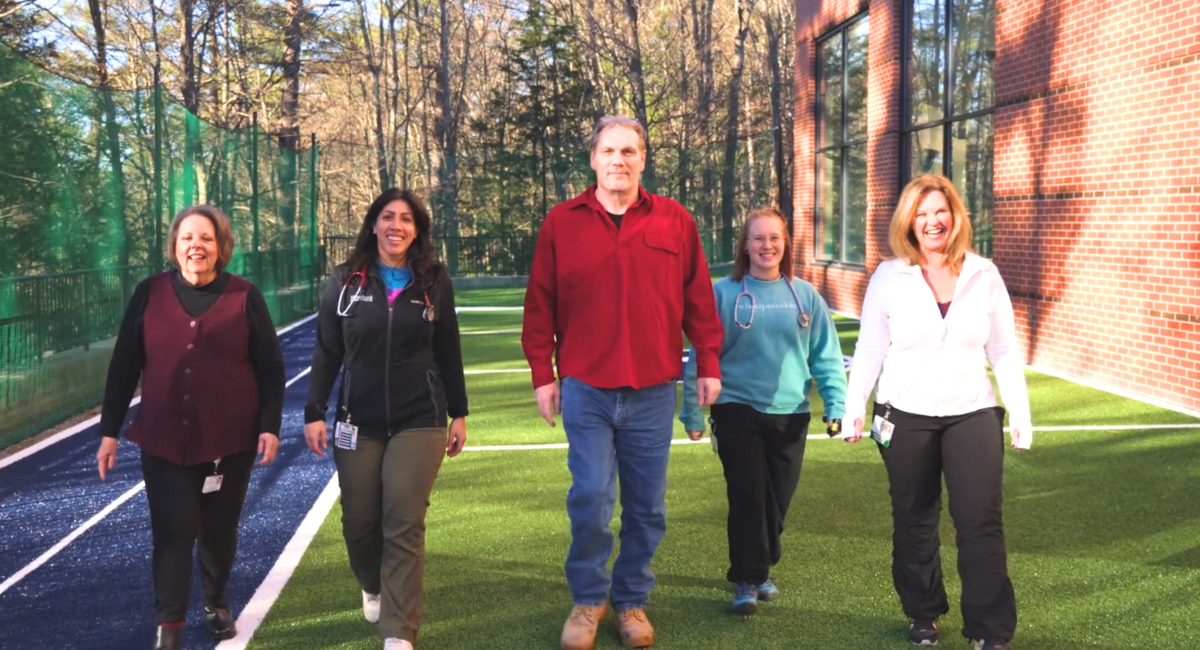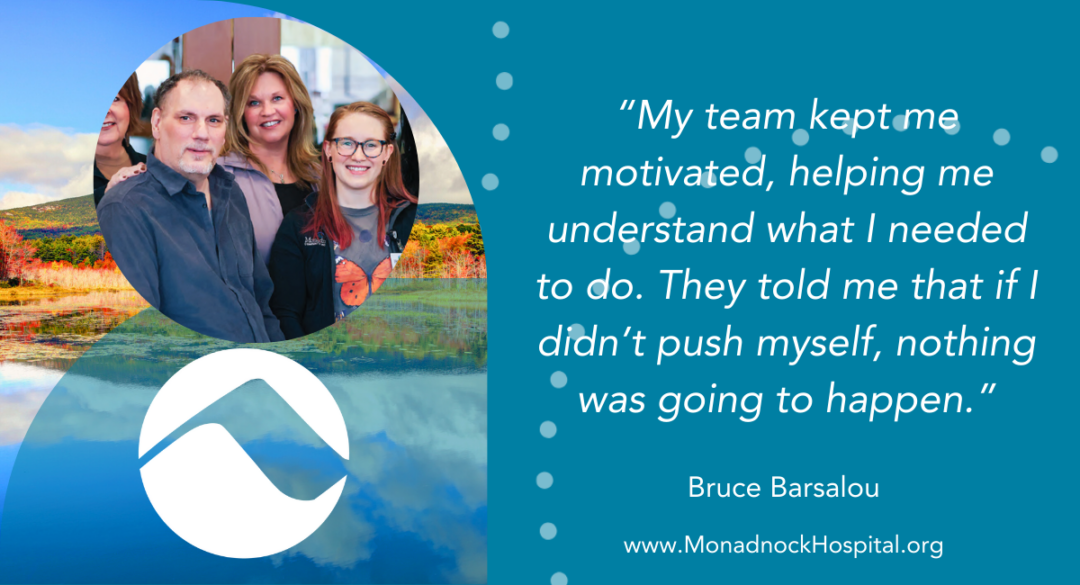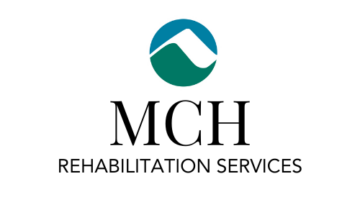
Pulmonary Fitness Services at MCH
Outpatient Pulmonary Fitness can help individuals return to a more active lifestyle through exercise, education and support. Our goal is to help patients achieve and maintain a maximum level of independent functioning and improved quality of life. Program components include patient assessment, exercise training, education and psycho-social support.
Routine activities such as putting on a pair of socks can leave some people fighting for air, while conditions such as smoking, environmental hazards or genetic factors can leave others chronically short of breath. Twice each week participants meet with healthcare professionals in an encouraging multidisciplinary approach that helps them become more fit and maximizes their ability to do those things each day that matter most.
Specialized Services
-
Asthma education and management
-
Inhaler technique and training
-
Six-minute walk test and/or oxygen titration
-
Respiratory muscle strength and endurance training
-
Bronchial hygiene therapy
Program Benefits
Benefits from the Pulmonary Fitness Program include:
- Improved quality of life
- Improved self confidence
- Decreased depression and anxiety
- Ability to return to work or leisure activities
- Improved ability for activities of daily living
- Increased muscle strength and endurance
- Reduced pulmonary exacerbations and decreased use of medical resources
- Reduced respiratory symptoms such as shortness of breath and fatigue
- Increased knowledge about lung disease & management
Conditions Treated:
- Emphysema
- Cystic fibrosis
- Chronic Bronchitis
- Acute lung disorders
- Persistent asthma
- Frequent or recurrent pulmonary infection
- Chronic Obstructive Pulmonary Disease (COPD)
- Acute or Chronic Oxygen Dependency
- Change in baseline breath sounds
- Change in baseline chest radiograph
- Alpha-1 Antitrypsin Deficiency
- Lung transplant
- Tracheostomy
- Bronchiectasis
The key to achieving these benefits is personal motivation and a commitment to making a lifestyle change!
The program consists of approximately 20 sessions, taking about 10 weeks to complete. Depending on your health status, you may require additional sessions, and we will work with your insurance company to verify your coverage.
Education
Education is essential to providing patients with the tools to feel empowered and confident to better manage the condition. Education topics include:
- Respiratory Medications
- Traveling with Lung Disease
- Anatomy and Physiology of the Lungs
- Energy Conservation and Work Simplification Techniques
- Breathing Retraining Techniques
- Nutritional Aspects of Lung Disease
- Oxygen Use
- Home Exercise Guidelines
- Principles of Exercise
- Environmental Factors
- Warning Signs of Illness
- Self-Management Strategies
- Bronchial Hygiene Techniques
- Sleep Hygiene
- Intimacy and Lung Disease
- MDI’s, DPI’s and Nebs
- Stress Management and Relaxation Techniques
- Community Resources
- Understanding Medical Tests
- Advance Directives
The exercise program is tailored to each individual’s fitness level and capabilities and will be designed to improve flexibility, strength, and cardiopulmonary endurance by incorporating:
- Stretching – Improves muscular flexibility and range of motion
- Strength Training – Use of hand weights and resistive bands with a focus on upper body exercise to improve respiratory muscle strength
- Aerobic Training – A combination of treadmill, stationary cycle, and upper body ergometer exercise is used to improve overall fitness
If you are looking for additional resources check out our list now.
For Physicians
Our 20-session outpatient program is designed to treat patients with a wide variety of lung diseases. The exercise, which incorporates stretching, strength training, and aerobic training, is individually tailored to each patient’s abilities.
Referring a Patient
If you have a patient you feel is a good candidate for pulmonary fitness and would like to refer him or her in our program, you can download our Referral Form. Once completed, you can fax it to us at 603-924-1718 along with the patient’s latest office note, most recent PFT’s and current EKG.
Pre-enrollment
Prior to beginning the program, each patient will be scheduled for an initial evaluation with a pulmonary fitness staff member. They will obtain a complete medical history, perform a physical assessment, complete a six minute walk test as well as complete health questionnaires. We require an EKG done within the past year. A repeat 6-minute walk will be performed on the last day as part of our outcomes assessment.
Session Monitoring
Blood pressure, heart rate, oxygen saturation, and breath sounds are all checked at rest before exercise. During the session, heart rate and oxygen saturation are monitored using a pulse oximeter while exercising. We do not use continuous telemetry monitoring; however, it is readily available should it be needed. Optimal oxygen saturation during exercise is at least 88%, and we will titrate supplemental oxygen if necessary. Blood pressure is checked while exercising. Shortness of breath is assessed using the Borg Scale of Perceived Dyspnea. If the patient also has diabetes, blood sugar will be checked prior to and following exercise.
Meet the Pulmonary Fitness Team
Dawne Beamer, TTS, RCP, Pulmonary Program Coordinator
Tobacco Treatment Specialist (TTS), Respiratory Care Practitioner (RCP)
Dawne Beamer is a Respiratory Care Practitioner; in addition, she holds a degree in Exercise Science and is a Tobacco Treatment Specialist as well. Dawne is the Outpatient Pulmonary Program Coordinator where she is responsible for the evaluation and management of patients with acute/chronic respiratory illnesses to optimize positive patient outcomes. She is passionate in providing quality patient care in achieving and maintaining cardiopulmonary health. Dawne has over 28 years of extensive experience working in the critical care setting, cardiopulmonary rehabilitation, cardiac stress testing, as well as ventilator and tracheal management for special populations. Dawne values her teams multidisciplinary team approach through critical thinking skills and collaboration with specialists to provide quality patient care. Through education, she encourages her patients to take an active role in their health.
Esther Moverman, CTTS, EP, LRCP, Pulmonary Specialist
Certified Tobacco Treatment Specialist (CTTS), Exercise Physiologist (EP), Licensed Respiratory Care Practitioner (LRCP)
Essy is a Registered Respiratory Therapist and Licensed Respiratory Care Practitioner with more than 30 years experience in creating and managing Pulmonary Programs in New Hampshire and Massachusetts. She helps those patients with chronic lung conditions achieve an improved quality of life through exercise, education and self-management strategies. Incorporating humor into all that she does, Essy has a passion for motivating her patients to achieve their goals, one breath at a time. In addition to being a Pulmonary Specialist, she is also a Tobacco Treatment Specialist, meeting with patients on an individual basis.
Gabriela Trust, EP TTS
Clinical Exercise Physiologist and a Tobacco Treatment Specialist
Gabriela is dedicated to improving patient health and well-being through evidence-based research at MCH since 2021. She received her Bachelor of Science in Exercise and Sports Science with a concentration in Clinical Exercise Physiology from Fitchburg State University in 2019. Gabriela specializes in creating tailored exercise interventions for individuals with chronic medical conditions in the Cardiac Rehabilitation, Pulmonary Fitness, and Movement as Medicine programs. In addition, Gabriela is a compassionate Tobacco Treatment Specialist who provides one-on-one counseling to help patients with tobacco cessation. After earning her certificate from UMass Chan Medical School in 2022, she uses her expertise to develop individualized, non-judgmental treatment plans that combine behavioral strategies and motivational support to promote long-term success. Gabriela is committed to empowering her patients by providing them with the tools and education needed for sustainable, healthy lifestyle modifications. In her free time, she enjoys listening to true crime podcasts and being outside enjoying nature.
For more information, please contact:
Dawne Beamer, RCP, TTS
Pulmonary Program Coordinator
Telephone: 603-924-4699 Ext 4291
Fax: 603-924-1718


Array
(
[section_title] =>
[section_text] =>
[posts_selection] => auto_taxonomy_terms
[section_posts] => Array
(
[0] => WP_Post Object
(
[ID] => 39668
[post_author] => 9192204
[post_date] => 2025-02-25 15:13:09
[post_date_gmt] => 2025-02-25 20:13:09
[post_content] =>
[post_title] => Video: Every Breath a Victory: One Man's Fight to Reclaim His Life: Bruce's Story
[post_excerpt] =>
[post_status] => publish
[comment_status] => closed
[ping_status] => closed
[post_password] =>
[post_name] => pulmonary-rehab-transformation-bruce-journey
[to_ping] =>
[pinged] =>
[post_modified] => 2025-09-16 12:06:13
[post_modified_gmt] => 2025-09-16 16:06:13
[post_content_filtered] =>
[post_parent] => 0
[guid] => https://monadnockcommunityhospital.com/?p=39668
[menu_order] => 0
[post_type] => post
[post_mime_type] =>
[comment_count] => 0
[filter] => raw
)
[1] => WP_Post Object
(
[ID] => 38147
[post_author] => 9192204
[post_date] => 2024-06-28 11:55:02
[post_date_gmt] => 2024-06-28 15:55:02
[post_content] =>
[post_title] => Heartfelt Stories - Breathing New Life: Bruce’s Journey to Independence
[post_excerpt] =>
[post_status] => publish
[comment_status] => closed
[ping_status] => closed
[post_password] =>
[post_name] => patient-stories-barsalou-2024
[to_ping] =>
[pinged] =>
[post_modified] => 2025-09-16 12:06:15
[post_modified_gmt] => 2025-09-16 16:06:15
[post_content_filtered] =>
[post_parent] => 0
[guid] => https://monadnockcommunityhospital.com/?p=38147
[menu_order] => 0
[post_type] => post
[post_mime_type] =>
[comment_count] => 0
[filter] => raw
)
[2] => WP_Post Object
(
[ID] => 38852
[post_author] => 9192204
[post_date] => 2016-04-15 13:08:57
[post_date_gmt] => 2016-04-15 17:08:57
[post_content] =>
[post_title] => QUIT 2b FIT: Your Comprehensive Path to Becoming Smoke-Free
[post_excerpt] =>
[post_status] => publish
[comment_status] => closed
[ping_status] => closed
[post_password] =>
[post_name] => quit-2b-fit-2016
[to_ping] =>
[pinged] =>
[post_modified] => 2025-09-17 11:53:53
[post_modified_gmt] => 2025-09-17 15:53:53
[post_content_filtered] =>
[post_parent] => 0
[guid] => https://monadnockcommunityhospital.com/?p=38852
[menu_order] => 0
[post_type] => post
[post_mime_type] =>
[comment_count] => 0
[filter] => raw
)
)
[posts_limit] => -1
[post_type] => post
[taxonomy] => tag
[terms] => pulmonary fitness
[section_id] => post-grid-8
)

 )
[_extra_sidebar_content_0_content] => Array
(
[0] => field_5b1ac5808389e
)
[page_sections_2_section_title] => Array
(
[0] =>
)
[_page_sections_2_section_title] => Array
(
[0] => field_5a84a22e00501
)
[page_sections_2_section_text] => Array
(
[0] =>
)
[_page_sections_2_section_text] => Array
(
[0] => field_5ada4e56edc7f
)
[page_sections_2_content_source] => Array
(
[0] => repeater
)
[_page_sections_2_content_source] => Array
(
[0] => field_5a8464a9dff14
)
[page_sections_2_accordion_row_heading_level] => Array
(
[0] => h3
)
[_page_sections_2_accordion_row_heading_level] => Array
(
[0] => field_5a859d7d03733
)
[page_sections_2_accordion_rows_0_heading] => Array
(
[0] => Specialized Services
)
[_page_sections_2_accordion_rows_0_heading] => Array
(
[0] => field_5a849de86875a
)
[page_sections_2_accordion_rows_0_content] => Array
(
[0] =>
)
[_extra_sidebar_content_0_content] => Array
(
[0] => field_5b1ac5808389e
)
[page_sections_2_section_title] => Array
(
[0] =>
)
[_page_sections_2_section_title] => Array
(
[0] => field_5a84a22e00501
)
[page_sections_2_section_text] => Array
(
[0] =>
)
[_page_sections_2_section_text] => Array
(
[0] => field_5ada4e56edc7f
)
[page_sections_2_content_source] => Array
(
[0] => repeater
)
[_page_sections_2_content_source] => Array
(
[0] => field_5a8464a9dff14
)
[page_sections_2_accordion_row_heading_level] => Array
(
[0] => h3
)
[_page_sections_2_accordion_row_heading_level] => Array
(
[0] => field_5a859d7d03733
)
[page_sections_2_accordion_rows_0_heading] => Array
(
[0] => Specialized Services
)
[_page_sections_2_accordion_rows_0_heading] => Array
(
[0] => field_5a849de86875a
)
[page_sections_2_accordion_rows_0_content] => Array
(
[0] =>